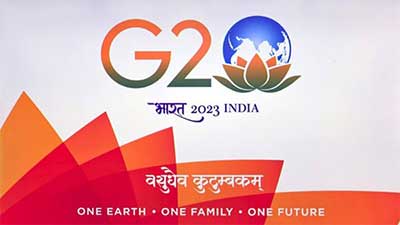Date: 22/12/2022
Relevance: GS-2: Bilateral, Regional and Global Groupings and Agreements involving India and/or affecting India’s interests; Health related issues.
Key Phrases: G20, Universal Health Care, Primary Health Care, Asthana Conference, Berlin Declaration 2017, Alma-Ata Declaration on PHC 1978, Sustainable Development Goal, Affordable and Comprehensive Health Care system.
Context:
- Recently, India officially took over G20 presidency for 2023, this is not just an occasion to show India’s growing stature in the international forum, but also an opportunity for setting an agenda for healthcare that has been one of the priority areas for G20 deliberations since 2017.
Key Highlights:
- The G20 has health finance in its financial stream and health systems development in the Sherpa stream.
- An annual G20 meeting of health ministers and a joint health and finance task force reflects the seriousness the subject has gained.
- The Berlin Declaration 2017 of the G20 health ministers provided
a composite approach focusing on pandemic preparedness, health system
strengthening and tackling antimicrobial resistance.
- The Covid-19 pandemic gave added urgency to pandemic preparedness and the Indonesian presidency in 2022 made it the major focus.
- In 2018, the Astana Conference organized by WHO and UNICEF put out a declaration stating that primary healthcare (PHC) is essential for fulfilling the UHC objectives.
Universal Health Coverage:
- The concept of Universal Health Coverage (UHC) was born in the 2000s to prevent catastrophic medical expenditures due to secondary and tertiary level hospital services by universalising health insurance coverage.
- The UHC has been the big global approach for health systems strengthening since 2010, also adopted in 2015 as the strategy for Sustainable Development Goal-3 on ensuring healthcare for all at all ages.
Drawbacks of UHC:
- Expenditures on outdoor services becoming catastrophic for poor households and preventing access to necessary healthcare and medicines.
- Many unnecessary/irrational medical interventions are undertaken for universal health coverage.
UHC-PHC Approach:
- In 2019, the UN General Assembly adopted the combined UHC-PHC approach as a political declaration.
- A PHC-with-UHC approach means strengthening primary level care linked to non-medical preventive action (food security and safety, safe water and air, healthy workspaces, and so on) through whole-of-society and whole-of-government approaches, and extending the “PHC principles” to secondary and tertiary care services.
- This could be the most cost-effective systems design — the comprehensive game changer that global health care requires.
- Building on the Alma Ata declaration on PHC of 1978, what must be
additionally included are the more recent initiatives that can be clustered
together under five themes.
- First, Making health central to development in all sectors:
- Health in all policies, one health (linking animal and human health for tackling antimicrobial resistance and zoonotic diseases), planetary health, pandemic preparedness.
- Second, Health systems strengthening:
- Designing PHC-with-UHC for diverse contexts.
- This can be a win-win system design for the users, medical personnel and those involved in the management of healthcare systems.
- Third, Appropriate technologies adopted as a norm — by strengthening health technology assessment, ethics of healthcare, equitable access to pharmaceutical products and vaccines, integrative health systems using plural knowledge systems rationally.
- Fourth, Health and healthcare from the perspective of the marginalized: Gendered health care needs, Health care of indigenous peoples globally, occupational health, mental health and wellbeing, healthy aging.
- Fifth, Decolonisation and democratization of health knowledge, with interests and perspectives of low-middle-income countries (LMICs), prevention and patient-centered healthcare.
- First, Making health central to development in all sectors:
G20
- About
- The G20 is a strategic multilateral platform connecting the world’s major developed and emerging economies.
- It started in 1999 as a meeting for the finance minister and central bank governors.
- Together, the G20 members represent more than 80 percent of world GDP, 75 percent of international trade and 60 percent of the world population.
- Membership
- It comprises 19 countries and the European Union (EU).
- Argentina, Australia, Brazil, Canada, China, France, Germany, India, Indonesia, Italy, Japan, Mexico, Russia, Saudi Arabia, South Africa, South Korea, Turkey, the United Kingdom, the United States and the European Union.
- Meetings
- The G20 has evolved into a yearly summit involving the Head of State and Government.
- The group has no permanent staff of its own, so every year in December, a G20 country from a rotating region takes on the presidency.
India’s Initiatives: Learning example for PHC-UHC Approach
- India has several pioneering initiatives that can contribute to the
PHC-with-UHC discussion. Some of them are listed below-
- Lessons from the National Health Mission for strengthening public health delivery;
- The HIV-control programme’s successful involvement of affected persons/communities and a complex well-managed service structure;
- Pluralism of health knowledge systems, each independently supported within the national health system;
- Health personnel such as the ASHAs, mid-level health providers and wellness centers, traditional community healthcare providers with voluntary quality certification;
- Research designed for validation of traditional systems;
- Pharmaceutical and vaccines production capacity;
- Social insurance schemes and people’s hospital models by civil society.
Way Forward:
- Drafting of PHC-with-UHC (a PHC 2.0) must be with a broad global
consensus and commitment to a more sustainable and people-empowering health
system.
- Pursuing such an agenda would involve much dialogue within countries, regions and globally.
- So, this process could be kick-started by working through the G20 Indian presidency year towards a call for organizing a global conference on rethinking healthcare systems that moves a Declaration on Sustainable and Empowering Health Care for the 21st Century.
Conclusion:
- Therefore, The G20, with its membership of the G7 high income countries and the emerging LMICs, and its think-tank structures, is an appropriate platform to take up this long unfinished agenda so that the dream of cost-effective and affordable, inclusive and just healthcare system can be achieved.
Source: Indian Express
Mains Question:
Q. “The PHC-with-UHC approach could be the most cost-effective and comprehensive health care system”. Critically examine the statement. (250 Words).








